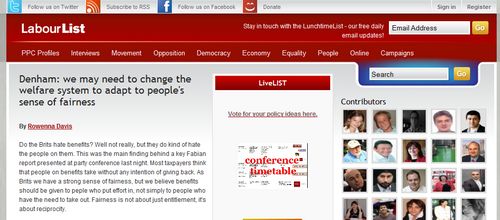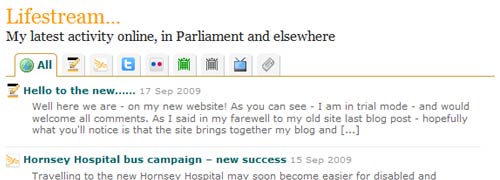A bit pushed for time just now, but I wanted to jot down a few thoughts regarding the launch of the Conservatives’ new community platform, MyConservatives.com. I hope they make sense.
- It’s built on an open-source platform – specifically Drupal. Almost certainly the right choice: after all, Drupal describes itself as ‘community plumbing’. For those who have never used it, Drupal is a startlingly powerful platform for all things social and online; but to me, that’s its downfall – I’ve always found it overwhelming.
- It fell over on day one. Happens to us all.
- Opening the system to allcomers, not just party members, is a brave move – but the right one, I think. (And is something I suggested Labour might do with Labourspace, back in March 2008.)
- Having said that, the heavy Conservative branding – including the use of an Eric Pickles video on the homepage – will put a lot of people off. I don’t see people registering for this unless they’re at least passively Tory.
- The ‘campaigns’ page – currently the heart of the site – has two key elements: ‘local campaigns’ and an events calendar. Neither are working well. When I put my postcode into the local search – even though I live in a Tory-LD marginal, high on the LDs’ list of target seats – it comes back: ‘Your local candidate doesn’t have a campaign team yet.‘ I’d have thought they’d pre-organise some of these key areas prior to launch. And there’s no encouragement for me to sign up to be notified if/when they do finally organise locally. The events listing is rather curious, initially showing me events from 2 to 10 Oct – not great when today’s the 13th.
- I really like the way they’ve illustrated what a donation pays for:

It demonstrates that even a token donation can have a material effect…
- … but I still think it’s an uphill struggle to get people to donate. We’re looking at a massive cultural change, at a time when public trust in politics really couldn’t be lower. I just can’t see it.
- The sign-up form isn’t too intrusive, but it doesn’t tell me what my details will get used for. Inevitably I’m assuming it’ll go straight into their junk-mailing database – which is why I haven’t signed up myself, incidentally.
- And whilst it may not be unique functionality – both Labour and the LibDems can rightly claim to have had a lot of the same tools for some considerable time – presentation and high-level commitment goes a long, long way. Even if it doesn’t really raise the bar, the perception is that it does.
- I wonder what will happen to it after the election?
 Bad news for anyone who’s just put a massive amount of work into an innovative, cutting-edge website for an MP. (
Bad news for anyone who’s just put a massive amount of work into an innovative, cutting-edge website for an MP. (






